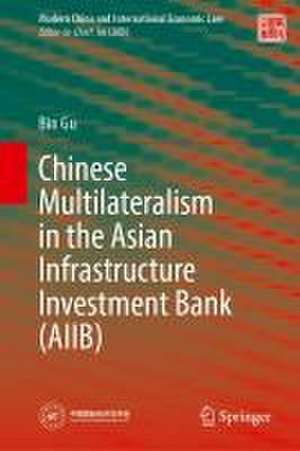Chinese Multilateralism in the Asian Infrastructure Investment Bank (AIIB): Modern China and International Economic Law
Autor Bin Guen Limba Engleză Hardback – 15 mai 2024
In particular, this book provides nuanced analysis of the following topics:
— capital allocation of the AIIB, in comparison with those of Bretton Woods institutions;
— dynamic relationship between the shareholder board and management, a central topic of corporate governance for the AIIB and other MDBs;
— AIIB’s environmental and social safeguards, including its frontier ESG portfolio investments, in comparison with the World Bank standards; — highly debatable issues relating to the interaction between AIIB, Belt and Road, and MCDF;
— comparative study of state-owned enterprises in the laws of AIIB, WTO, ICSID, etc..
This book targets academics, students, policymakers, and businesscircles who are interested in AIIB, given the bank’s growing importance in the context of global economic governance reforms. First, the book is a must for those who are keen to gain insight into the AIIB. Ten years have passed since the debut of the idea of AIIB in 2013, and the topic has never retreated from the debate of the international community—a major concern is whether a China-led multilateral development bank (MDB) remains to be politically neutral, or professional, and can live up to high standards.
Preț: 891.65 lei
Preț vechi: 1087.38 lei
-18% Nou
Puncte Express: 1337
Preț estimativ în valută:
170.62€ • 178.59$ • 142.01£
170.62€ • 178.59$ • 142.01£
Carte tipărită la comandă
Livrare economică 31 martie-14 aprilie
Preluare comenzi: 021 569.72.76
Specificații
ISBN-13: 9789819712182
ISBN-10: 9819712181
Ilustrații: VIII, 195 p. 6 illus., 1 illus. in color.
Dimensiuni: 155 x 235 mm
Greutate: 0.46 kg
Ediția:2024
Editura: Springer Nature Singapore
Colecția Springer
Seria Modern China and International Economic Law
Locul publicării:Singapore, Singapore
ISBN-10: 9819712181
Ilustrații: VIII, 195 p. 6 illus., 1 illus. in color.
Dimensiuni: 155 x 235 mm
Greutate: 0.46 kg
Ediția:2024
Editura: Springer Nature Singapore
Colecția Springer
Seria Modern China and International Economic Law
Locul publicării:Singapore, Singapore
Cuprins
Chapter 1. Members’ shareholding: A GDP-based formula.- Chapter 2. Corporate governance: The non-resident Board.- Chapter 3. Operational standards: Environmental and Social Framework 2021.- Chapter 4. MCDF: A multilateral fund administered by the AIIB.- Chapter 5. The issue of SOEs: Perspectives of AIIB and other institutions.
Notă biografică
Bin Gu is an associate professor of international law at Beijing Foreign Studies University (BFSU). He used to work with the World Trade Organization and the Chinese Ministry of Commerce. Gu has written extensively on the theme of China’s approach towards global economic governance, focusing on the Asian Infrastructure Investment Bank (AIIB) and the Belt and Road Initiative for the past decade. He has published widely in both English and Chinese, totalling more than 100 articles and 3 monographic books. He has consulted for the Chinese Ministry of Foreign Affairs, the Chinese Ministry of Commerce, the Chinese Ministry of Finance, and the AIIB. Gu has a Ph.D. from the University of International Business and Economics (UIBE), China, and an LL.M. from Harvard Law School. He was a Fulbright visiting scholar at East Asian Legal Studies (EALS), Harvard University in 2010.
Textul de pe ultima copertă
This book reflects the latest legal development of the Asian Infrastructure Investment Bank (AIIB), and makes direct and positive responses—it uses first-hand, authoritative information and makes insightful and persuasive analyses in addressing those concerns.
In particular, this book provides nuanced analysis of the following topics:
— capital allocation of the AIIB, in comparison with those of Bretton Woods institutions;
— dynamic relationship between the shareholder board and management, a central topic of corporate governance for the AIIB and other MDBs;
— AIIB’s environmental and social safeguards, including its frontier ESG portfolio investments, in comparison with the World Bank standards;
— highly debatable issues relating to the interaction between AIIB, Belt and Road, and MCDF;
— comparative study of state-owned enterprises in the laws of AIIB, WTO, ICSID, etc..
This book targets academics, students, policymakers, and business circles who are interested in AIIB, given the bank’s growing importance in the context of global economic governance reforms. First, the book is a must for those who are keen to gain insight into the AIIB. Ten years have passed since the debut of the idea of AIIB in 2013, and the topic has never retreated from the debate of the international community—a major concern is whether a China-led multilateral development bank (MDB) remains to be politically neutral, or professional, and can live up to high standards.
— capital allocation of the AIIB, in comparison with those of Bretton Woods institutions;
— dynamic relationship between the shareholder board and management, a central topic of corporate governance for the AIIB and other MDBs;
— AIIB’s environmental and social safeguards, including its frontier ESG portfolio investments, in comparison with the World Bank standards;
— highly debatable issues relating to the interaction between AIIB, Belt and Road, and MCDF;
— comparative study of state-owned enterprises in the laws of AIIB, WTO, ICSID, etc..
This book targets academics, students, policymakers, and business circles who are interested in AIIB, given the bank’s growing importance in the context of global economic governance reforms. First, the book is a must for those who are keen to gain insight into the AIIB. Ten years have passed since the debut of the idea of AIIB in 2013, and the topic has never retreated from the debate of the international community—a major concern is whether a China-led multilateral development bank (MDB) remains to be politically neutral, or professional, and can live up to high standards.
Caracteristici
Reflects the latest legal development of the Asian Infrastructure Investment Bank Covers the milestone legal events that have occurred to the AIIB, in particular during the past five years Benefits from the lens of Chinese multilateralism, a theoretical concept I coined and have kept honing in on











